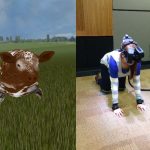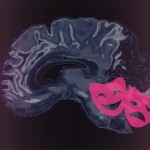What’s Your Best Face for Online Dating?
Rewire — December 20, 2016
Professors Rory McGloin and Amanda Denes were featured on Rewire for their research on online dating profiles. McGloin and Denes were interested in the process people go through to decide who to pursue off of online dating sites and apps. After studying “trustworthiness” in terms of profiles, their research shows “If you present a more beautified version of yourself you are more desirable but you might be considered more untrustworthy.” McGloin adds “long term, maybe it’s better to put a more authentic version of yourself.”
Social Media Offers Venue for Crowds of Sports Fans
UConn Today — December 12, 2016
Professor David Atkin was featured in UConn Today where he analyzed the growing amount of interactivity that social media allows sports fans to have. Social media creates a platform for fans everywhere to start conversations about their favorite teams. Atkin came to the conclusion that “everything has to be re-conceptualized in the paradigm of internet and social media, which are the biggest predictor of social capital or being involved in a community.”
 Here’s Why CNN Became a Lightning Rod for Accusations of Media Bias
Here’s Why CNN Became a Lightning Rod for Accusations of Media Bias
Fortune — December 3, 2016
Professor David D’Alessio was featured in Fortune Magazine where he spoke about the influence of media bias in the presidential election. D’Alessio called into question media coverage of the campaigns and the candidates ability to manipulate the media to their advantage. The article came to the conclusion that, “CNN and its fellow traditional media outlets will need to rely more on analysis in the future rather than trying to compete with social media, which can disseminate news widely and instantly in the short form.”
 Great Classes: Comm 1000 Receives National Award
Great Classes: Comm 1000 Receives National Award
UConn CLAS — November 21, 2016
On the last day of class in spring 2015, the first semester after Assistant Professor in Residence of Communication Steve Stifano and his colleagues overhauled their approach to teaching Comm 1000: The Process of Communication, the auditorium’s 350 students rose from their seats in applause. Now, more than a year later, the course is being formally recognized by the National Communication Association (NCA) with its Basic Course Program of Distinction Award for 2016.
Is media bias really rampant? Ask the man who studies it for a living
Poynter — October 24, 2016
Professor Dave D’Alessio used knowledge from his studies of media usage in presidential elections to observe the current role that media bias plays in the current election period. D’Alessio stated that “the very nature of bias is that it’s a perception — it’s something that people see and they base it on what they see,” while comparing the current presidential campaigns to ones past.
Source is Key to Credibility in Social Media Messaging
UConn Today — October 13, 2016
Professor Kenneth Lachlan co-authored a study that explored the credibility that news has as it is shared among social media. The study set out to observe how people “make sense of, or believe and listen to certain messages” through media. They found that information coming directly from a reputable source, such as the Centers for Disease Control, is perceived to be most credible, while the information loses credibility as it is shared through social media.
Presidential Election: How You Process Information Determines Your Vote
UConn Today — October 11, 2016
During this election period there are many factors that determine a person’s choice of political candidate. Professor of Communication Carolyn Lin observes the “cognitive schema” that manages the amount of mental effort that is devoted to the campaigns and their messaging. Lin states that voter’s decisions will be a result of their information processing style and how it shapes their decision-making process.
Virtual Reality Project Lets Users See Life as a Doomed Cow or Piece of Coral
The Guardian — October 3, 2016
A new study co-authored by Professor of Communication Kristine Nowak used virtual reality to heighten connections to environmental issues. Participants experienced the world through a cow that was destined for slaughter and a dying piece of coral. Researchers found that the virtual reality created a stronger connection with the nature than watching it on a screen. The journal states that the virtual reality “could be used as a valuable tool in promoting ecological awareness.”
Has Sean Hannity’s Trump support crossed the line?
The Christian Science Monitor — September 21, 2016
The extent of Fox News host Sean Hannity’s support for Republican presidential candidate Donald Trump may become a problem with his network. While it is not the host’s first encounter with news ethics, David D’Alessio, an associate professor of communications at UConn’s Stamford campus, believes Hannity has crossed the line. D’Alessio said, “He allowed the campaign to have a more or less unfettered channel to the public. His behavior is literally ethically inappropriate.”

Are You A ‘Spring Baby?’ Here’s How It Affects Your Personality
The Huffington Post — April 5, 2016
Spring has a way of influencing the dispositions of people, which is never more true than for spring babies. Emerging research has continued to suggest that the season you are born in can impact your health and personality. Professor of Communication Mark Hamilton analyzed over 300 public figures, including celebrities, artists, scientists, and politicians, and discovered that the majority of them were born in “wet” months, like early spring, and were thus more likely to be creative and innovative.
Science News for Students — March 3, 2016
The use of smartphones has only increased over the years, and while these devices often come in handy—information at your fingertips—research also shows they can negatively affect students’ schoolwork. Professors Saras Bellur and Kristine Nowak note that students using their smartphones during class or while doing homework may be under the impression that they can multitask, when in reality it is harming their performance.
 Brain-Imaging Technology Reveals Hidden Emotions
Brain-Imaging Technology Reveals Hidden Emotions
UConn Today — February 5, 2016
UConn’s new state-of-the-art fMRI scanner in the Brain Imaging Research Center allows researchers to visualize the brain carrying out language and other cognitive tasks in real time. Professor Ross Buck discusses this new technology, adding “we now have the opportunity to actually see how the brain is reacting to emotional stimuli, and things that were previously hidden are now observable and measurable.”


